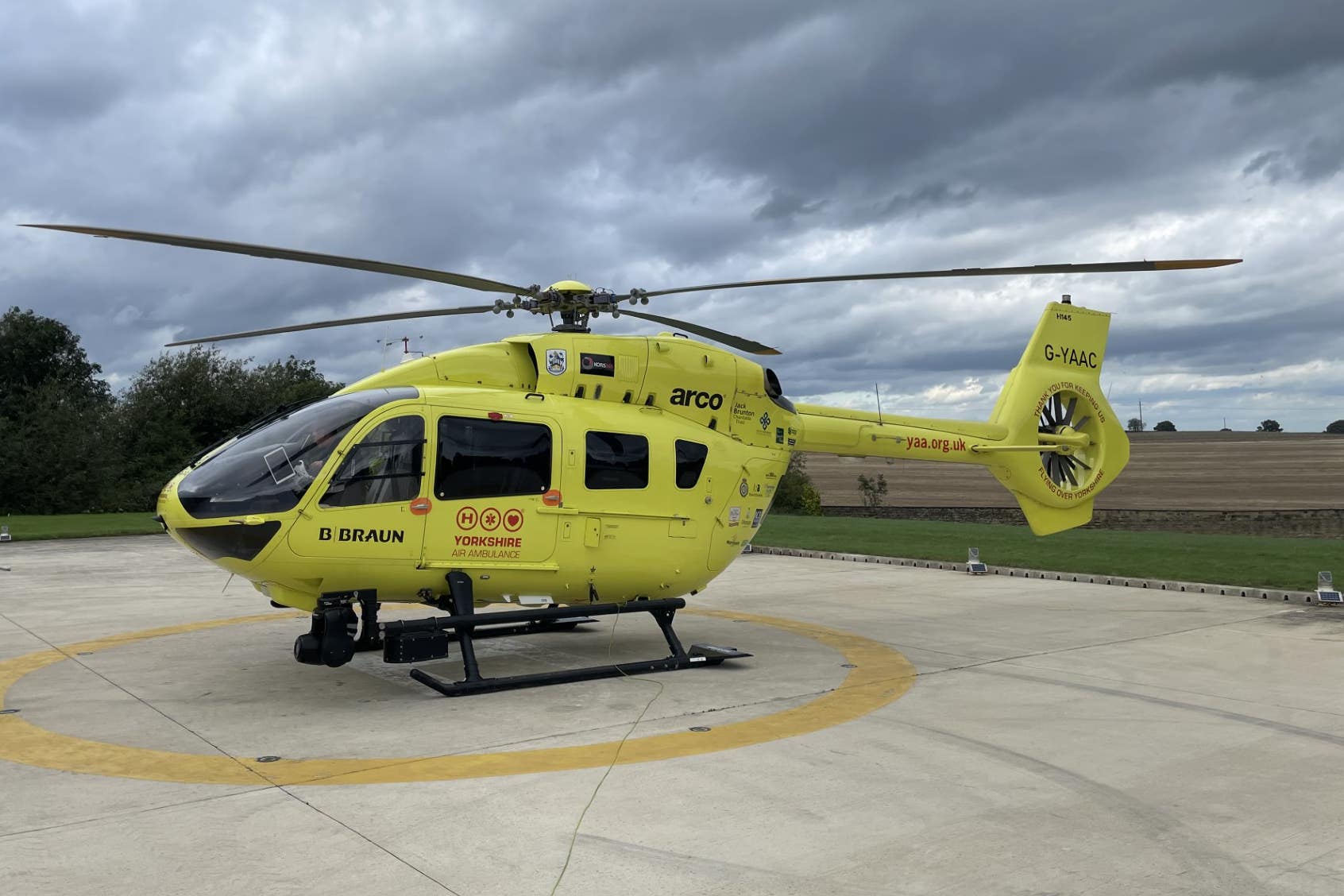Air ambulance crew member feared for his sight after mid-air laser attack
Alex Clark was sitting next to the pilot when he suffered a burn to his eye as the Yorkshire Air Ambulance flew over Bradford.

Your support helps us to tell the story
From reproductive rights to climate change to Big Tech, The Independent is on the ground when the story is developing. Whether it's investigating the financials of Elon Musk's pro-Trump PAC or producing our latest documentary, 'The A Word', which shines a light on the American women fighting for reproductive rights, we know how important it is to parse out the facts from the messaging.
At such a critical moment in US history, we need reporters on the ground. Your donation allows us to keep sending journalists to speak to both sides of the story.
The Independent is trusted by Americans across the entire political spectrum. And unlike many other quality news outlets, we choose not to lock Americans out of our reporting and analysis with paywalls. We believe quality journalism should be available to everyone, paid for by those who can afford it.
Your support makes all the difference.An air ambulance crew member has described how he feared for his sight after he was hit in the eye by a laser in the latest act of “senseless stupidity”.
Technical crew member Alex Clark was sitting next to the pilot in the Yorkshire Air Ambulance (YAA) as it was flying at 1500ft over Bradford, West Yorkshire, on Friday evening when the laser penetrated his night vision goggles and burned the cornea on his right eye.
YAA says this was the third laser incident in a week and the latest in a recent “disturbing rapid escalation” in attacks on its aircraft.
Mr Clark, 30, told the PA news agency: “A green laser went straight through the right side of my goggles, causing them the flare-out.
“As I’ve turned my head, it’s hit my right eye.
“Initially, I couldn’t see for about 30 seconds and, after that, I got quite blurred vision.
“It really affected me.”
Mr Clark, who is engaged to be married and is a father to four-year-old twins, said he initially continued to help with the incident they had been called to but realised he could not continue working when he returned to the YAA base at Nostell, near Wakefield.
He said that it was lucky another technician was available or the aircraft would have been grounded.
His vision was still very blurred the next morning so he went to an optician who told him he had a burn on his cornea.
But he was relieved to find that it has mostly healed in the days since the incident last week.
Asked if he was worried it could have been even more serious, Mr Clark, from Dewsbury, said: “100% yes.
There appears to be no discernible pattern or motive behind these acts of senseless stupidity
“This is something that I’m very aware of. This is the one career I want and if this affects my eyesight…”
But he said he was right next to the pilot and, if his eyes had been hit instead, it could have brought down the helicopter.
Mr Clark said: “Unfortunately, we have been lasered numerous times. This one time has just been one that’s really affected me.
“For the laser to put a burn into my eye at 1500ft means this is quite a serious laser pen.
“This is almost something that people have specifically bought, which I hope is not the case but I can’t rule it out.”
Mr Clark said he loves his job, which combines navigating the aircraft with acting as an emergency care assistant once they have landed to help a casualty.
He said: “This is the third one we’ve had in two weeks now. It is getting more and more.”
He said certain areas tend to be hotspots and he and his colleagues are concerned that the culprits might use flight-tracking apps to follow the flightpath.
“They might need us one day,” Mr Clark said.
“Their family members might need us one day.
“We’re here to provide care for really, really severely injured patients.
“If this carries on, it’s potentially going to affect how we operate at night.”
Mr Clark, who was an Army medic for six years and then worked on conventional ambulances before joining YAA, said his fiancee was “really upset” about the incident.
“I want to go home safe and sound and not have to worry about risks that have happened at work,” he said.
A YAA spokeswoman said: “These attacks, characterised by their intermittent and seemingly random nature, have left the YAA searching for answers, as there appears to be no discernible pattern or motive behind these acts of senseless stupidity.”
YAA chief pilot Owen McTeggart said: “If we get a laser attack while trying to land at the site of an incident, it means we cannot land, and the injured person on the ground doesn’t get the care that we are there to provide.
“It doesn’t take much for the eyes to be permanently damaged by a laser, and while the laser itself might not be a danger if it doesn’t contact the eyes, it is a massive distraction for the crew during a critical stage of flight and causes much distress.”
Mr McTeggart said: “I’m sure most people who point a laser at a helicopter think it’s just a laugh and no harm is caused.
“But it can, in some cases, have life-changing consequences for the pilot, the crew, and, if it’s an air ambulance under threat, the patient in the back whose life they are trying to save.”